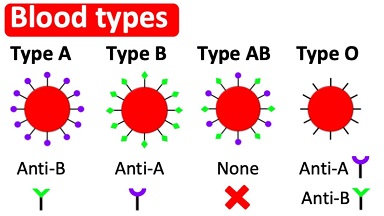Danish Study Validates That Those With Blood Group O And Those With Pre-Existing Anti-A And Anti-B Antibodies Have A Lower Risk Of COVID-19!
COVID-19 News - Blood Group O - Lower Risk Of COVID-19 Jun 06, 2023 2 years, 7 months, 1 week, 4 days, 4 hours, 47 minutes ago
Danish researchers unveil groundbreaking findings that reveal how blood type and pre-existing antibodies offer protection against COVID-19, potentially changing the game in the fight against the pandemic.
COVID-19 News: Scientists at Copenhagen University Hospital-Denmark and the University of Copenhagen have uncovered a vital link between blood types and susceptibility to COVID-19. Their study reveals that individuals with blood type O and those possessing pre-existing anti-A and anti-B antibodies have a significantly lower risk of contracting the virus. These study findings have the potential to revolutionize our understanding of COVID-19 and pave the way for targeted prevention strategies.

While past studies and
COVID-19 News reports had indicated that those from blood group O were less susceptible to COVID-19 infections, this new study using detailed methods validated these previous findings.
https://www.thailandmedical.news/news/breaking-coronavirus-research-reveals-that-people-with-blood-type-a-have-higher-risk-of-contracting-covid-19-compared-to-blood-type-o-which-has-a-low
https://www.thailandmedical.news/news/european-covid-19-research-indicates-that-individuals-with-blood-group-type-a-might-be-more-vulnerable-to-respiratory-failure
https://www.thailandmedical.news/news/covid-19-research-german-study-identifies-two-genetic-variants-associated-with-covid-19-respiratory-failure-and-role-of-blood-type-in-susceptibility
https://www.thailandmedical.news/news/covid-19-research-harvard-study-shows-that-covid-19-patients-with-blood-groups-a-and-ab-at-higher-risks-of-major-adverse-cardiovascular-events
The Study
During the period from April to September 2020, the study team observed incidents in three hospitals where healthcare workers, without personal protection, cared for undiagnosed COVID-19 patients. Among the 108 exposed staff members, 34 were later diagnosed with COVID-19. The study focused on analyzing ABO blood types, anti-A and anti-B antibody titers, blood group-specific alleles, and the impact of secretor fucosyltransferase 2 (FUT2) status on extracellular ABH antigen deposition.
Findings
Th
e study revealed several groundbreaking associations between blood types and COVID-19 susceptibility. Individuals with blood type O exhibited a significantly lower risk of contracting the virus compared to those with blood types A, B, and AB. Moreover, individuals with high levels of anti-A immunoglobulin G (IgG) and anti-B immunoglobulin M (IgM) antibodies demonstrated a reduced risk of COVID-19 compared to those with low or no titers of these antibodies.
Furthermore, the presence of the 33Pro variant in Integrin beta-3 (ITGB3), a gene responsible for the platelet antigen polymorphism HPA-1b, was also associated with a lower risk of COVID-19. This suggests that certain genetic factors may play a role in protecting individuals from the virus.
Implications and Significance
The findings of this Danish study have far-reaching implications for our understanding of COVID-19 susceptibility and transmission. By identifying specific blood types and the presence of pre-existing antibodies as protective factors, researchers may be able to develop targeted preventive measures to reduce the spread of the virus.
The study also highlights the potential for blood type incompatibility between the virus-producing host and the recipient as a mechanism for reducing susceptibility to infection. Additionally, the researchers speculate that pre-existing antibodies may initiate long-term anti-viral immunity, offering potential benefits beyond immediate protection.
It is important to note that these findings align with previous research linking blood types to susceptibility to infectious diseases. However, this study provides crucial insights into the mechanisms underlying this association and the potential for leveraging these findings in the fight against COVID-19.
Conclusion
This Danish study opens up exciting possibilities in the battle against COVID-19. By identifying blood type O and the presence of pre-existing anti-A and anti-B antibodies as protective factors, researchers may be able to develop innovative strategies to prevent and reduce the transmission of the virus. This groundbreaking research has the potential to reshape our understanding of COVID-19 susceptibility and inform future interventions to combat the pandemic.
The study findings were published in the peer reviewed journal: Immunobiology.
https://www.sciencedirect.com/science/article/pii/S0171298523000670
For the latest
COVID-19 News, keep on logging to Thailand Medical News.
